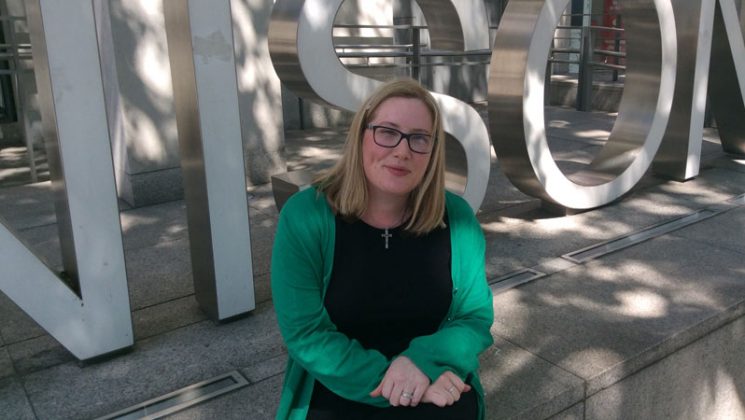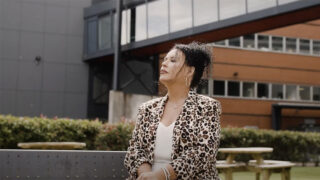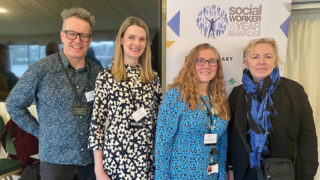Emma Lewell-Buck is in her element. She’s talking shop – but it’s with a room full of social workers, not Westminster bigwigs as you might expect for an MP. She was a social worker herself, before she was elected to the Commons in 2013 as the first female MP to represent South Shields.
Now she is a member of Labour’s front-bench team as shadow minister for children and families. And it’s clear she knows what she’s talking about – something social workers haven’t been used to when it comes to politicians.
As the MP herself says: “The current government doesn’t understand children’s services. They’re getting the basics wrong. Caseloads are soaring, recruitment and retention is abysmal, training is all fast-track, crumbling IT infrastructure causes inefficiency and frustration.
“Plus, austerity has increased the number of people accessing services. The problems social workers face are all intrinsically interlinked with wider societal and economic issues.”
This is something social workers regularly point out, so they welcome the recognition from someone who could potentially run the show one day.
“The government pumps out a narrative that social workers are incompetent and underperforming,” says Ms Lewell-Buck. “But they neglect the fact that it’s not just about leadership and practice skills. Social work is very much impacted by investment.
“They pump out policies to pay lip service and look like they’re doing something about ‘lazy social’ workers. They’re trying to pin the blame on us, rather than their own policies, which are driving this dire situation. Then any spending they do prioritise is spent on the wrong stuff – it’s badly misjudged.”
Reappraising the system
But what would a Labour government do differently? Ms Lewell-Buck is pushing for Labour to lead a full review of the entire care system, making the point that children and families come in and out of the system at different stages: the whole system needs to be appraised holistically.
Her views on privatisation and outsourcing are clear as well. “If I was a minister, I would bring it all back in house,” she declares. “Families aren’t ripe for profit.”
At the meeting with social workers, someone points that, fundamentally, more resources are what is required. How would Labour meet that need?
Ms Lewell-Buck answers that while, for the Tories, no-one at the top “gets it”, Labour’s shadow chancellor John McDonnell has a deep understanding of the care system and interest in children, and he would be the one running the budget as a well-placed ally.
Plus, she will be there herself, fighting for social workers, children and families.
The shadow minister finishes with the point that social work needs to be demystified – it’s important for people to recognise the importance of social services and the impact it has on society and the need to invest at an earlier age.
Born and bred
On a different note, Emma Lewell-Buck is the first woman elected to represent South Shields, where she was born and bred in a family of shipyard workers. So, has she got any advice to young women looking to get into politics?
“In politics, there are lots of people who look very confident and look like they know what they’re talking about – but scratch the surface, and they’re often not,” she observes. “So don’t ever feel you’re not good enough.
“I used to always think, ‘Oh I’d love to be an MP’. But then I’d think, ‘I could never be like that – I don’t talk as nice as them’.
“The reality is, you’re there to talk about your community and the people you represent. It’s better if you sound like them and look like them.
“Don’t be put off when you see Parliament on the TV. We need more people that look like and sound like the community they represent. We need people who are real voices for their community.”

This interview takes place on the same day that Dame Tessa Jowell – another social worker turned politician – passed away. Was the fact that both women were social workers something that linked their outlook? How does Emma’s background as a social worker affected her perspective on politics and society?
She points out that being a social worker means you get to see the very best and very worst of humanity, all the time.
“You see the worst things people can do to each other – but also the people who step up and help.
“Poverty, disadvantage and abuse – they’re all things you can actually feel in the room. It’s not something you can put into words, you just feel it. That’s something that stays with you forever.
“I’ll never forget some of the worst experiences I had as a social worker. And I’ll always be driven by wanting to make sure no child and no family ever has to live like that in our country.”
As for Tessa Jowell, Ms Lewell-Buck remembers how grateful she was for her time and generosity when she was a new MP. “I had an early meeting with Tessa – she reached out to me just after I got elected. She was really busy, but she took me for a coffee and we sat for about two and a half hours.
“She taught me things about parliamentary process and how it works that that I’ll always remember. She was so lovely – a proper lady.
“I think we should have more social workers in politics. We’re problem solvers. We’ve got something rich and important to contribute to parliament.”





